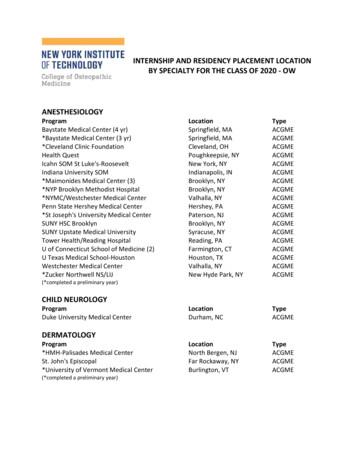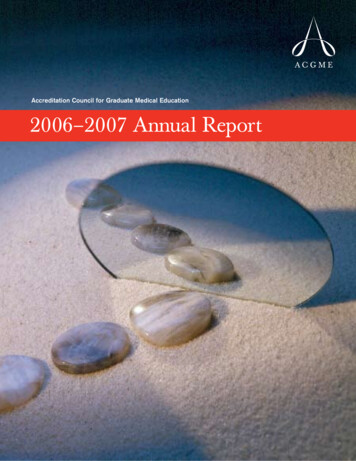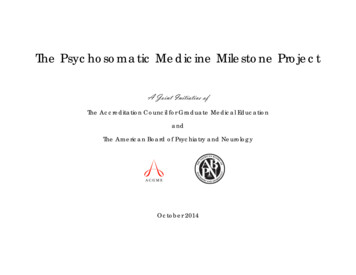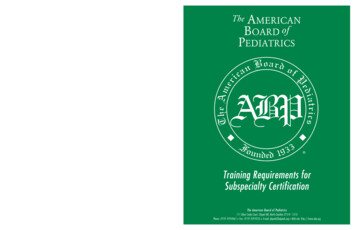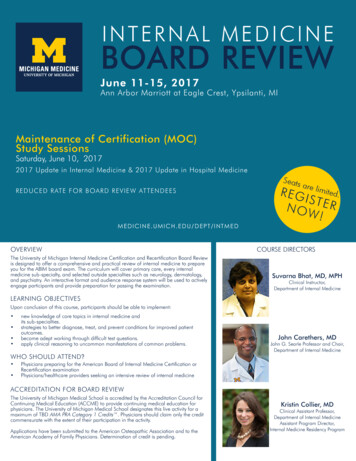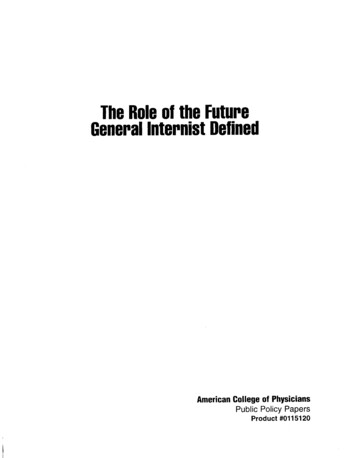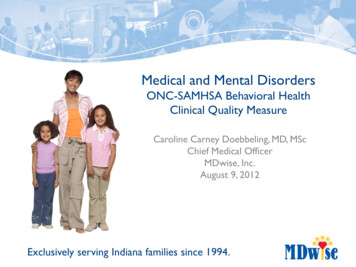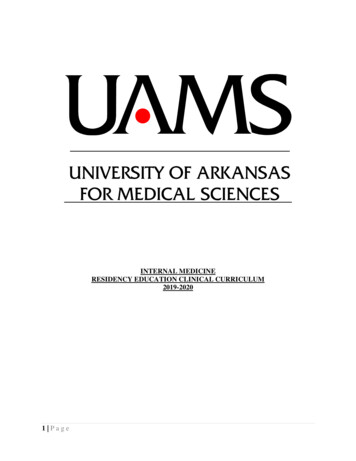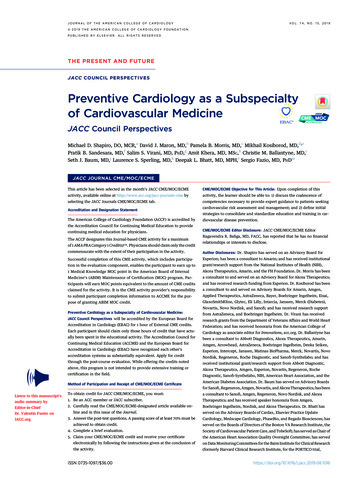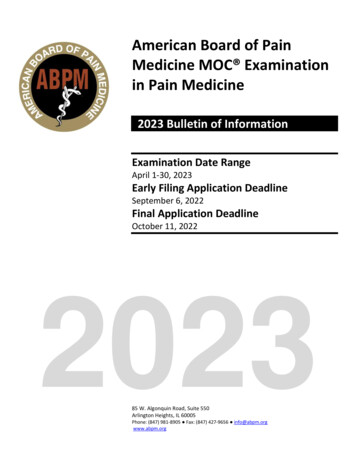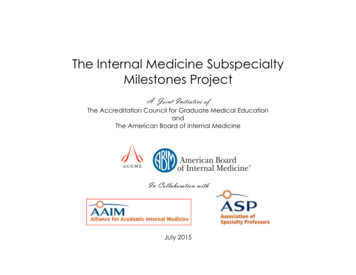
Transcription
The Internal Medicine SubspecialtyMilestones ProjectA Joint Initiative ofThe Accreditation Council for Graduate Medical EducationandThe American Board of Internal MedicineIn Collaboration withJuly 2015
Milestone ReportingThis document presents milestones designed for programs to use in semi-annual review of fellow performance and reporting to the ACGME.Milestones are knowledge, skills, attitudes, and other attributes for each of the ACGME competencies that describe the development ofcompetence from an early subspecialty learner up to and beyond that expected for unsupervised practice. In the initial years of implementation,the Review Committee will examine Milestone performance data for each program’s fellows as one element in the Next Accreditation System(NAS) to determine whether fellows overall are progressing.The Subspecialty Milestones are arranged in columns of progressive stages of competence that do not correspond with post-graduate year ofeducation. For each reporting period, programs will need to review the Milestones, identify those that best describe a fellow’s currentperformance, and ultimately select a box that best represents the summary performance for that sub-competency (see the figure on page v).Selecting a response box in the middle of a column implies that the fellow has substantially demonstrated those milestones, as well as those inprevious columns. Selecting a response box on a line in between columns indicates that milestones in the lower columns have been substantiallydemonstrated, as well as some milestones in the higher column.A general interpretation of each column for subspecialty medicine is as follows:Not Yet Assessable: This option should be used only when a fellow has not yet had a learning experience in the sub-competency.Critical Deficiencies: These learner behaviors are not within the spectrum of developing competence. Instead they indicate significantdeficiencies in a fellow’s performance.Column 2: Describes behaviors of an early learner.Column 3: Describes behaviors of a fellow who is advancing and demonstrating improvement in performance related to milestones.Ready for Unsupervised Practice: Describes behaviors of a fellow who substantially demonstrates the milestones identified for a physicianwho is ready for unsupervised practice. This column is designed as the graduation target, but the fellow may display these milestones at anypoint during fellowship.Aspirational: Describes behaviors of a fellow who has advanced beyond those milestones that describe unsupervised practice. Thesemilestones reflect the competence of an expert or role model and can be used by programs to facilitate further professional growth. It isexpected that only a few exceptional fellows will demonstrate these milestones behaviors.For each ACGME competency domain, programs will also be asked to provide a summative evaluation of each fellow’s learning trajectory.i
Additional NotesThe “Ready for Unsupervised Practice” milestones are designed as the graduation target but do not represent a graduation requirement. Makingdecisions about readiness for graduation is the purview of the residency program director (See the Milestones FAQ for further discussion of thisissue: “Can a resident/fellow graduate if he or she does not reach every milestone?”). Study of Milestone performance data will be required beforethe ACGME and its partners will be able to determine whether the “Ready for Unsupervised Practice” milestones and all other milestones are in theappropriate stage within the developmental framework, and whether Milestone data are of sufficient quality to be used for high stakes decisions.Answers to Frequently Asked Questions about Milestones are available on the Milestones web tonesFAQ.pdf.ii
Listed below are the societies and members who have participated in the development of the Internal Medicine Subspecialty ReportingMilestones.Chairs: Scott Gitlin, MD and John Flaherty, MDAccreditation Council of Graduate Medical Education: James Arrighi, MD; Susan Swing, PhD; Jerry Vasilias, PhDAlliance for Academic Internal Medicine: D. Craig Brater, MD; Margaret Breida; Kelly Caverzagie, MD; Gregory C. Kane, MD; Consuelo NelsonGrier; Polly Parsons, MD; Bergitta SmithAmerican Academy of Hospice and Palliative Care Medicine: Laura Morrison, MD; Steven Radwany, MD; Timothy Quill, MDAmerican Academy of Sleep Medicine: Vishesh Kapur, MD; Becky Roberts; Michael Silber, MB ChBAmerican Association for the Study of Liver Diseases: Adrian Di Bisceglie, MD; Oren Fix, MD; Ayman Koteish, MDAmerican Association of Clinical Endocrinologists: Pasquale Palumbo, MD; Dace Trence, MDAmerican Board of Internal Medicine: Lee Berkowitz, MD; Eric Holmboe, MD; Sarah Hood; William Iobst, MD; Sharon Levin, MD; SandraYaichAmerican College of Cardiology: Jill Foster; Marcia Jackson, PhD; Jeff Kuvin, MD; Eric Williams, MDAmerican College of Chest Physicians: Doreen Addrizzo-Harris, MD; John Buckley, MD; Paul Markowski, CAE; Curtis Sessler, MD; KennethTorrington, MDAmerican College of Gastroenterology: Seth Richter, MD; Ronald Szyjkowski, MDAmerican College of Physicians: Patrick Alguire, MD; Molly Cooke, MDAmerican College of Rheumatology: Marcy Bolster, MD; Calvin Brown, MDAmerican Gastroenterological Association: Tamara Jones; Lori Marks, PhD; Darrell Pardi, MD; Suzanne Rose, MD; Brijen Shah, MDAmerican Geriatrics Society: Jan Busby-Whitehead, MD; Lisa Granville, MD; Rosanne Leipzig, MDAmerican Society of Clinical Oncology: Frances Collichio, MD; Marilyn Raymond, MD; Jamie Von Roenn, MDAmerican Society of Gastrointestinal Endoscopy: Diane Alberson; Walter Coyle, MD; Robert Sedlack, MDAmerican Society of Hematology: Linda Burns, MD; Charles Clayton; Karen Kayoumi; Elaine Muchmore, MDAmerican Society of Nephrology: Nancy Adams, MD; Raymond Harris, MD; Tod Ibrahim; Ryan RussellAmerican Society of Nuclear Cardiology: Brian Abbott, MD; James Arrighi, MDAmerican Thoracic Society: Henry Fessler, MDAssociation of Program Directors in Endocrinology, Diabetes and Metabolism: Ashok Balasubramanyan, MD; Ann Danoff, MD; GeethaGopalakrishnan, MDAssociation of Pulmonary and Critical Care Medicine Program Directors: Craig Piquette, MD; David Schulman, MDAssociation of Specialty Professors: John Flaherty, MD; Mark Geraci, MD; Scott Gitlin, MD; Don Rockey, MD; Joshua Safer, MDInfectious Diseases Society of America: Wendy Armstrong, MD; Daniel Havlichek, Jr, MDSociety of Cardiac Angiography and Interventions: Tarek Helmy, MD; Daniel Kolansky, MDSociety of Critical Care Medicine: Stephen Pastores, MD; Antoinette Spevetz, MDThe Endocrine Society: Beverly Biller, MD; Ailene Cantelmiiii
The diagram below presents an example set of milestones for one sub-competency in the same format as the ACGME Report Worksheet. For eachreporting period, a fellow’s performance on the milestones for each sub-competency will be indicated by: selecting the column of milestones that best describes that fellow’s performanceor, selecting the “Critical Deficiencies” response boxSelecting a response box in the middle of acolumn implies milestones in that column aswell as those in previous columns have beensubstantially demonstrated. The fellow is intransition to the next level of development.Selecting a response box on the line inbetweencolumns indicates that milestones in lower levels havebeen substantially demonstrated as well as somemilestones in the higher columns(s).iv
Version 10/2014Internal Medicine Subspecialty Milestones: ACGME Report Worksheet1. Gathers and synthesizes essential and accurate information to define each patient’s clinical problem(s). (PC1)Not YetAssessableCritical DeficienciesDoes not or isinconsistently able tocollect accuratehistorical dataDoes not perform or usean appropriatelythorough physical exam,or misses key physicalexam findingsRelies exclusively ondocumentation ofothers to generate owndatabase or differentialdiagnosis or is overlyreliant on secondarydataFails to recognizepatient’s central clinicalproblemsConsistently acquiresaccurate and relevanthistoriesConsistently performsaccurate andappropriately thoroughphysical examsInconsistently recognizespatient’s central clinicalproblem or developslimited differentialdiagnosesAcquires accuratehistories in an efficient,prioritized, andhypothesis-drivenfashionPerforms accuratephysical exams that aretargeted to the patient’sproblemsUses and synthesizescollected data to define apatient’s central clinicalproblem(s) to generate aprioritized differentialdiagnosis and problemlistReady for unsupervisedpracticeObtains relevant historicalsubtleties, includingsensitive information thatinforms the differentialdiagnosisAspirationalRole-models and teachesthe effective use of historyand physical examinationskills to minimize the needfor further diagnostictestingIdentifies subtle orunusual physical examfindingsEfficiently utilizes allsources of secondary datato inform differentialdiagnosisEffectively uses historyand physical examinationskills to minimize the needfor further diagnostictestingFails to recognizepotentially lifethreatening problemsComments:The Milestones are a product of the Internal Medicine Subspecialty Project, a Joint Initiative of the Accreditation Council for Graduate Medical Education and theAmerican Board of Internal Medicine.1
Version 10/2014Internal Medicine Subspecialty Milestones: ACGME Report Worksheet2. Develops and achieves comprehensive management plan for each patient. (PC2)Not YetAssessableCritical DeficienciesCare plans areconsistentlyinappropriate orinaccurateDoes not react tosituations that requireurgent or emergencycareDoes not seek additionalguidance when neededInconsistently developsan appropriate care planConsistently developsappropriate care planInconsistently seeksadditional guidance whenneededRecognizes situationsrequiring urgent oremergency careSeeks additional guidanceand/or consultation asappropriateReady for unsupervisedpracticeAppropriately modifiescare plans based onpatient’s clinical course,additional data, patientpreferences, and costeffectiveness principlesRecognizes diseasepresentations that deviatefrom common patternsand require complexdecision-making,incorporating diagnosticuncertaintyAspirationalRole-models and teachescomplex and patientcentered careDevelops customized,prioritized care plans forthe most complexpatients, incorporatingdiagnostic uncertainty andcost-effectivenessprinciplesManages complex acuteand chronic conditionsComments:The Milestones are a product of the Internal Medicine Subspecialty Project, a Joint Initiative of the Accreditation Council for Graduate Medical Education and theAmerican Board of Internal Medicine.2
Version 10/2014Internal Medicine Subspecialty Milestones: ACGME Report Worksheet3. Manages patients with progressive responsibility and independence. (PC3)Not YetAssessableRequires direct supervision Requires indirectto ensure patient safety and supervision to ensurequality carepatient safety and qualitycareRequires direct supervisionto manage problems orProvides appropriatecommon chronic diseases in preventive care and chronicall appropriate clinicaldisease management in allsettingsappropriate clinical settingsReady for unsupervisedpracticeIndependently managespatients across applicableinpatient, outpatient, andambulatory clinicalsettings who have a broadspectrum of clinicaldisorders, includingundifferentiatedsyndromesInconsistently providespreventive care in allappropriate clinical settingsSeeks additional guidanceand/or consultation asappropriateCritical DeficienciesCannot advance beyondthe need for directsupervision in thedelivery of patient careCannot manage patientswho require urgent oremergency careDoes not assumeresponsibility for patientmanagement decisionsRequires direct supervisionto manage patients withstraightforward diagnosesin all appropriate clinicalsettingsUnable to manage complexinpatients or patientsrequiring intensive careProvides comprehensivecare for single or multiplediagnoses in all appropriateclinical settingsUnder supervision,provides appropriate carein the intensive care unitInitiates management plansfor urgent or emergencycareAspirationalEffectively managesunusual, rare, or complexdisorders in all appropriateclinical settingsAppropriately managessituations requiring urgentor emergency careEffectively supervises themanagement decisions ofthe team in all appropriateclinical settingsCannot independentlysupervise care provided byother members of thephysician-led teamComments:The Milestones are a product of the Internal Medicine Subspecialty Project, a Joint Initiative of the Accreditation Council for Graduate Medical Education and theAmerican Board of Internal Medicine.3
Version 10/2014Internal Medicine Subspecialty Milestones: ACGME Report Worksheet4a. Demonstrates skill in performing and interpreting invasive procedures. (PC4a)Not YetAssessableCritical DeficienciesAttempts to performinvasive procedureswithout sufficienttechnical skill orsupervisionPossesses insufficienttechnical skill for safecompletion of commoninvasive procedures withappropriate supervisionFails to recognize cases inwhich invasiveprocedures areunwarranted or unsafeInattentive to patientsafety and comfort whenperforming invasiveproceduresDoes not recognize theneed to discussprocedure indications,processes, or potentialrisks with patientsApplies the ethicalprinciples of informedconsentFails to engage thepatient in the informedconsent process, and/ordoes not effectivelydescribe risks andbenefits of proceduresRecognizes the need toobtain informed consentfor procedures, butineffectively obtains itUnderstands andcommunicates ethicalprinciples of informedconsentPossesses basic technicalskill for the completion andinterpretation of somecommon invasiveprocedures with appropriatesupervisionInconsistently managespatient safety and comfortwhen performing invasiveproceduresInconsistently recognizesappropriate patients,indications, and associatedrisks in the performance ofinvasive proceduresObtains and documentsinformed consentReady for unsupervisedpracticeConsistently demonstratestechnical skill tosuccessfully and safelyperform and interpretinvasive proceduresMaximizes patient comfortand safety whenperforming invasiveproceduresConsistently recognizesappropriate patients,indications, and associatedrisks in the performance ofinvasive proceduresAspirationalDemonstrates skill toindependently perform andinterpret complex invasiveprocedures that areanticipated for futurepracticeDemonstrates expertise toteach and supervise othersin the performance ofinvasive proceduresDesigns consent instrumentfor a human subjectresearch study; files anInstitution Review Board(IRB) applicationEffectively obtains anddocuments informedconsent in challengingcircumstances (e.g.,language or culturalbarriers)Quantifies evidence forrisk-benefit analysis duringobtainment of informedconsent for complexprocedures or therapiesComments: Not ApplicableThe Milestones are a product of the Internal Medicine Subspecialty Project, a Joint Initiative of the Accreditation Council for Graduate Medical Education and theAmerican Board of Internal Medicine.4
Version 10/2014Internal Medicine Subspecialty Milestones: ACGME Report Worksheet4b. Demonstrates skill in performing and interpreting non-invasive procedures and/or testing. (PC4b)Not YetAssessableCritical DeficienciesDoes not recognizepatients for whom noninvasive proceduresand/or testing is notwarranted or is unsafeAttempts to perform orinterpret non-invasiveprocedures and/ortesting without sufficientskill or supervisionDoes not recognize theneed to discussprocedure indications,processes, or potentialrisks with patientsFails to engage thepatient in the informedconsent process and/ordoes not effectivelydescribe risks andbenefits of proceduresPossesses insufficient skillto safely perform andinterpret non-invasiveprocedures and/ortesting with appropriatesupervisionInconsistently recognizesappropriate patients,indications, andassociated risks in theutilization of non-invasiveprocedures and/or testingInattentive to patientsafety and comfort whenperforming non-invasiveprocedures and/ortesting proceduresInconsistently integratesprocedures and/or testingresults with clinicalfeatures in the evaluationand management ofpatientsApplies the ethicalprinciples of informedconsentRecognizes need toobtain informed consentfor procedures butineffectively obtains itUnderstands andcommunicates ethicalprinciples of informedconsentCan safely perform andinterpret selected noninvasive proceduresand/or testing procedureswith minimal supervisionInconsistently recognizeshigh-risk findings andartifacts/normal variantsObtains and documentsinformed consentReady for unsupervisedpracticeConsistently recognizesappropriate patients,indications, limitations,and associated risks inutilization of non-invasiveprocedures and/or testingIntegrates proceduresand/or testing results withclinical findings in theevaluation andmanagement of patientsRecognizes proceduresand/or testing results thatindicate high-risk state oradverse prognosisAspirationalDemonstrates skill toindependently performand interpret complexnon-invasive proceduresand/or testingDemonstrates expertise toteach and superviseothers in the performanceof advanced non-invasiveprocedures and/or testingDesigns consentinstrument for a humansubject research study;files an Institution ReviewBoard (IRB) applicationRecognizes artifacts andnormal variantsConsistently performs andinterprets non-invasiveprocedures and/or testingin a safe and effectivemannerEffectively obtains anddocuments informedconsent in challengingcircumstances (e.g.,language or culturalbarriers)The Milestones are a product of the Internal Medicine Subspecialty Project, a Joint Initiative of the Accreditation Council for Graduate Medical Education and theAmerican Board of Internal Medicine.5
Version 10/2014Internal Medicine Subspecialty Milestones: ACGME Report WorksheetQuantifies evidence forrisk-benefit analysisduring obtainment ofinformed consent forcomplex proceduresand/or testsComments: Not ApplicableThe Milestones are a product of the Internal Medicine Subspecialty Project, a Joint Initiative of the Accreditation Council for Graduate Medical Education and theAmerican Board of Internal Medicine.6
Version 10/2014Internal Medicine Subspecialty Milestones: ACGME Report Worksheet5. Requests and provides consultative care. (PC5)Not YetAssessableCritical DeficienciesIs unresponsive toquestions or concerns ofothers when acting as aconsultant or utilizingconsultant servicesInconsistently managespatients as a consultantto otherphysicians/health careteamsUnwilling to utilizeconsultant serviceswhen appropriate forpatient careInconsistently applies riskassessment principles topatients while acting as aconsultantProvides consultationservices for patients withclinical problems requiringbasic risk assessmentAsks meaningful clinicalquestions that guide theinput of consultantsReady for unsupervisedpracticeProvides consultationservices for patients withbasic and complex clinicalproblems requiringdetailed risk assessmentAppropriately integratesrecommendations fromother consultants inorder to effectivelymanage patient careAspirationalProvides consultationservices for patients withvery complex clinicalproblems requiringextensive risk assessmentModels management ofdiscordantrecommendations frommultiple consultantsInconsistently formulatesa clinical question for aconsultant to addressComments:Patient CareThe fellow is demonstrating satisfactory development of the knowledge, skill, and attitudes/behaviors needed to advance in the trainingprogram. He or she is demonstrating a learning trajectory that anticipates the achievement of competency for unsupervised practice that includesthe delivery of safe, effective, patient-centered, timely, efficient, and equitable care.YesNo Conditional on ImprovementThe Milestones are a product of the Internal Medicine Subspecialty Project, a Joint Initiative of the Accreditation Council for Graduate Medical Education and theAmerican Board of Internal Medicine.7
Version 10/2014Internal Medicine Subspecialty Milestones: ACGME Report Worksheet6. Possesses Clinical knowledge (MK1)Not YetAssessableCritical DeficienciesLacks the scientific,socioeconomic, orbehavioral knowledgerequired to providepatient carePossesses insufficientscientific, socioeconomic,and behavioralknowledge required toprovide care for commonmedical conditions andbasic preventive carePossesses the scientific,socioeconomic, andbehavioral knowledgerequired to provide carefor common medicalconditions and basicpreventive careReady for unsupervisedpracticePossesses the scientific,socioeconomic, andbehavioral knowledgerequired to provide carefor complex medicalconditions andcomprehensive preventivecareAspirationalPossesses the scientific,socioeconomic, andbehavioral knowledgerequired to successfullydiagnose and treatmedically uncommon,ambiguous, and complexconditionsComments:The Milestones are a product of the Internal Medicine Subspecialty Project, a Joint Initiative of the Accreditation Council for Graduate Medical Education and theAmerican Board of Internal Medicine.8
Version 10/2014Internal Medicine Subspecialty Milestones: ACGME Report Worksheet7. Knowledge of diagnostic testing and procedures. (MK2)Not YetAssessableCritical DeficienciesLacks foundationalknowledge to applydiagnostic testing andprocedures to patientcareReady for unsupervisedpracticeInterprets complexdiagnostic tests accuratelywhile accounting forlimitations and biasesAnticipates and accountsfor subtle nuances ofinterpreting diagnostictests and proceduresPursues knowledge ofnew and emergingdiagnostic tests andproceduresInconsistently interpretsbasic diagnostic testsaccuratelyConsistently interpretsbasic diagnostic testsaccuratelyDoes not understand theconcepts of pre-testprobability and testperformancecharacteristicsNeeds assistance tounderstand the conceptsof pre-test probability andtest performancecharacteristicsKnows the indications for,and limitations of,diagnostic testing andproceduresMinimally understandsthe rationale and risksassociated with commonproceduresFully understands therationale and risksassociated with commonproceduresUnderstands the conceptsof pre-test probability andtest performancecharacteristicsAspirationalTeaches the rationale andrisks associated withcommon procedures andanticipates potentialcomplications ofproceduresComments:The Milestones are a product of the Internal Medicine Subspecialty Project, a Joint Initiative of the Accreditation Council for Graduate Medical Education and theAmerican Board of Internal Medicine.9
Version 10/2014Internal Medicine Subspecialty Milestones: ACGME Report Worksheet8. Scholarship. (MK3)Not YetAssessableCritical DeficienciesFoundationUnaware of oruninterested in scientificinquiry or scholarlyproductivityInterested in scholarlyactivity, but does notinitiate or follow throughIdentifies areas worthy ofscholarly investigation andformulates a plan undersupervision of a mentorInvestigationUnwilling to performscholarly investigation inthe specialtyPerforms a literaturesearch using relevantscholarly sources toidentify pertinent articlesCritically reads scientificliterature and identifiesmajor methodologicalflaws and inconsistencieswithin or betweenpublicationsAnalysisFails to engage in criticalthinking regarding clinicalpractice, qualityimprovement, patientsafety, education, orresearchAware of basic statisticalconcepts, but hasincompleteunderstanding of theirapplication;inconsistently identifiesmethodological flawsUnderstands and is able toapply basic statisticalconcepts, and can identifypotential analyticmethods for data orproblem assessmentReady for unsupervisedpracticeFormulates ideas worthyof scholarly investigationAspirationalIndependently formulatesnovel and important ideasworthy of scholarlyinvestigationCollaborates with otherinvestigators to designand complete a projectrelated to clinical practice,quality improvement,patient safety, education,or researchLeads a scholarly projectadvancing clinical practice,quality improvement,patient safety, education,or researchCritiques specializedscientific literatureeffectivelyCritiques specializedscientific literature at alevel consistent withparticipation in peerreviewDissects a problem into itsmany component partsand identifies strategiesfor solvingUses analytical methodsof the field effectivelyObtains independentresearch fundingEmploys optimal statisticaltechniquesTeaches analytic methodsin chosen field to peersand othersCommunicatesDisseminationrudimentary details ofEffectively presents atPresents scholarly activity Effectively presentsUnable or unwilling toscientific work, including journal club, qualityat local or regionalscholarly work at nationaleffectively communicatehis or her own scholarlyimprovement meetings,meetings, and/or submits and internationaland/or disseminatework; needs to improveclinical conferences,an abstract summarizingmeetingsknowledgeand/or is able toscholarly work toThe Milestones are a product of the Internal Medicine Subspecialty Project, a Joint Initiative of the Accreditation Council for Graduate Medical Education and theAmerican Board of Internal Medicine.10
Version 10/2014Internal Medicine Subspecialty Milestones: ACGME Report Worksheetability to present in smallgroupseffectively describe anddiscuss his or her ownscholarly work or researchregional/state/ nationalmeetings, and/orpublishes non-peerreviewed manuscript(s)(reviews, book chapters)Publishes peer-reviewedmanuscript(s) containingscholarly work (clinicalpractice, qualityimprovement, patientsafety, education, orresearch)Comments:Medical KnowledgeThe fellow is demonstrating satisfactory development of the knowledge, skill, and attitudes/behaviors needed to advance in the trainingprogram. He or she is demonstrating a learning trajectory that anticipates the achievement of competency for unsupervised practice that includesthe delivery of safe, effective, patient-centered, timely, efficient, and equitable care.YesNo Conditional on ImprovementThe Milestones are a product of the Internal Medicine Subspecialty Project, a Joint Initiative of the Accreditation Council for Graduate Medical Education and theAmerican Board of Internal Medicine.11
Version 10/2014Internal Medicine Subspecialty Milestones: ACGME Report Worksheet9. Works effectively within an interprofessional team (e.g., with peers, consultants, nursing, ancillary professionals, and other support personnel).(SBP1)Not YetAssessableCritical DeficienciesRefuses to recognize thecontributions of otherinterprofessional teammembersFrustrates teammembers withinefficiency and errorsFrequently requiresreminders from team tocomplete physicianresponsibilities (e.g., talkto family, enter orders)Identifies roles of otherteam members, but doesnot recognize how/whento utilize them asresourcesParticipates in teamdiscussions whenrequired, but does notactively seek input fromother team membersUnderstands the roles andresponsibilities of all teammembers, but uses themineffectivelyActively engages in teammeetings andcollaborative decisionmakingReady for unsupervisedpracticeUnderstands the roles andresponsibilities of, andeffectively partners with,all members of the teamEfficiently coordinatesactivities of other teammembers to optimize careAspirationalDevelops, trains, andinspires the teamregarding unexpectedevents or new patientmanagement strategiesViewed by other teammembers as a leader inthe delivery of highquality careComments:The Milestones are a product of the Internal Medicine Subspecialty Project, a Joint Initiative of the Accreditation Council for Graduate Medical Education and theAmerican Board of Internal Medicine.12
Version 10/2014Internal Medicine Subspecialty Milestones: ACGME Report Worksheet10. Recognizes system error and advocates for system improvement. (SBP2)Not YetAssessableCritical DeficienciesIgnores a risk for errorwithin the system thatmay affect the care of apatientIgnores feedback and isunwilling to changebehavior in order toreduce the risk for errorDoes not recognize theRecognizes the potentialpotential for system error for error within thesystemMakes decisions thatcould lead to errors thatIdentifies obvious orare otherwise correctedcritical causes of error andby the system ornotifies supervisorsupervisionaccordinglyResistant to feedbackabout decisions that maylead to error or otherwisecause harmRecognizes the potentialrisk for error in theimmediate system andtakes necessary steps tomitigate that riskWilling to receivefeedback about decisionsthat may lead to error orotherwise cause harmReady for unsupervisedpracticeIdentifies systemic causesof medical error andnavigates them to providesafe patient careAdvocates for safe patientcare and optimal patientcare systemsActivates formal systemresources to investigateand mitigate real orpotential medical errorReflects upon and learnsfrom own critical incidentsthat may lead to medicalerrorAspirationalAdvocates for systemleadership to formallyengage in qualityassurance and qualityimprovement activitiesViewed as a leader inidentifying and advocatingfor the prevention ofmedical errorTeaches others regardingthe importance ofrecognizing and mitigatingsystem errorComments:The Milestones are a product of the Internal Medicine Subspecialty Project, a Joint Initiative of the Accreditation Council for Graduate Medical Education and theAmerican Board of Internal Medicine.13
Version 10/2014Internal Medicine Subspecialty Milestones: ACGME Report Worksheet11. Identifies forces that impact the cost of health care, and advocates for and practices cost-effective care. (SBP3)Not YetAssessableCritical DeficienciesIgnores cost issues inthe provision of careDemonstrates no effortto overcome barriers tocost-effective careLacks aware
Version 10/2014 Internal Medicine Subspecialty Milestones: ACGME Report Worksheet The Milestones are a product of the Internal Medicine Subspecialty Project, a Joint Initiative of the Accreditation Council for Graduate Medical Education and the American Board of Internal Medicine. 4 4a.
